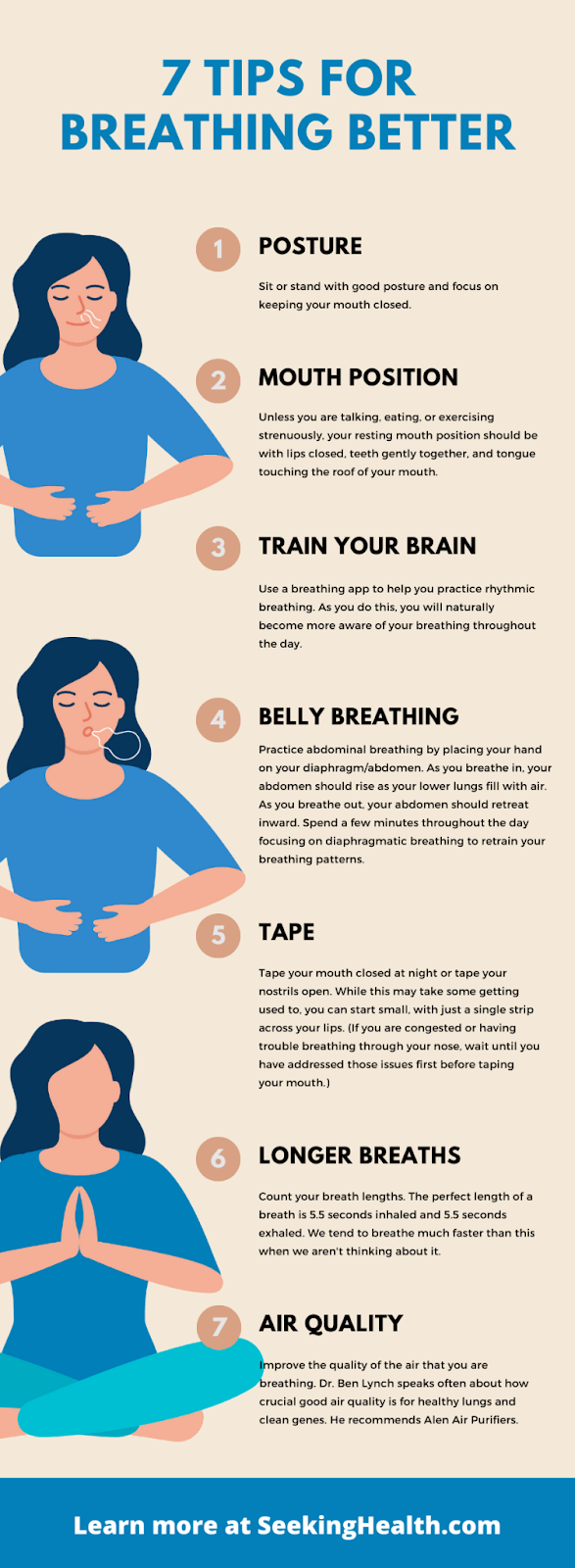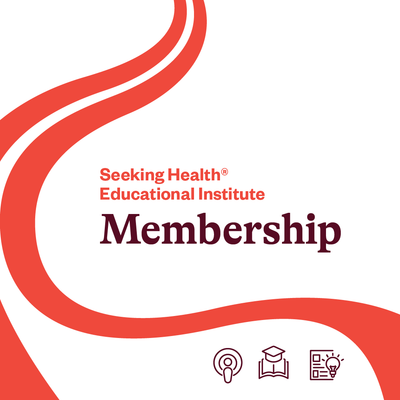Have you ever found yourself breathing through your mouth, even if you’re not gasping for air? You might even do it without knowing.
Researchers estimate that between 30 and 50 percent of the population could be chronic mouthbreathers, with even higher rates in children. (1, 2, 3)
It may not seem like a big deal, but defaulting to mouth breathing actually has a significant negative impact on health. Like other aspects of wellness, you can train yourself to breathe correctly. Learning to breathe properly is simple and can be a cheap intervention for numerous health challenges.
Mouth breathing can have a significant negative impact on health.
Breathing through the nose vs. the mouth may help to calm the mind, reduce stress, address sinusitis, get rid of chronic bad breath, alleviate snoring, decrease sleep apnea, and could even improve your lifespan.
Sound too good to be true? Let’s explore more about the benefits of proper breathing and how you can improve your health with some simple steps.
Why is Mouth Breathing Bad?

Mouth breathing might seem harmless. As long as you are getting oxygen, does it really matter how it gets there?
Turns out, it does.
Downsides of Mouth Breathing
Breathing through the mouth has several negative effects on overall health.
Mouth breathing leads to over-breathing. This can result in actually taking in excessive oxygen for needs, which can lead to decreased lung function or trouble breathing after higher activity levels, like exercise. (4)
The air that we breathe is part oxygen (O2) and part carbon dioxide (CO2). When we breathe in oxygen, it is picked up by the hemoglobin in red blood cells, then transported around the body. The body needs carbon dioxide and nitric oxide to trigger the release of oxygen from hemoglobin though—if we breathe in too much oxygen without the CO2 and nitric oxide release triggers, the body can actually have less oxygen to use.
CO2 helps to dilate blood vessels and airways, preparing them to receive oxygen. It’s the tango between these two that allows the body to have all the air that it needs. Without the push and pull effect of O2 and CO2, endless oxygen would go unused by the cells since it would not be released.
We mostly exhale CO2, which is a necessary part of the breathing cycle. However, because CO2 buildup can feel uncomfortable, especially if under stress or fatigue, many times our bodies become accustomed to rushing the in and out transfer of O2 and CO2. This allows for less time for CO2 and nitric oxide to build up, and therefore, less time to release oxygen into the cells of the body. So even though we breathe faster, the exchange of oxygen is less efficient.
Mouth breathing leads to over-breathing and less efficient oxygen exchange.
Mouth breathing isn’t only an issue for oxygen and carbon dioxide airflow exchange. It can also lead to dental problems. These can include bad breath, gingivitis, and dry mouth. It can even alter the oral development of children, leading to problems like overbite or crowded teeth. (5, 6)
There are other complications associated with mouth breathing. These can include ear or throat infections, sinus infections, and even poor sleep. In children, the long-lasting effects of poor sleep can influence cognitive performance in school, poor growth, and reduced ability to concentrate. (7)
Causes of Mouth Breathing

Some people may be more disposed to breathe through their mouths than others. People whose facial structure is longer or those who have more narrow mouths may have smaller nasal passages. This may mean that they default to mouth breathing, especially during sleep. (8)
Other common causes of mouth breathing include: (9, 10)
- Blocked nasal passages from allergies, sinus infections, or septal defects
- Stress
- Inflammation
- Pollution
- Dry indoor air
- Large adenoids or tonsils
Signs You Are Breathing Through Your Mouth
Not sure you breathe through your nose? Common signs of breathing through your mouth in your sleep include:
- Snoring
- Sleep apnea
- Fatigue or never feeling truly rested after sleep
- Having focus problems
- Dry mouth
- Bad breath
- Sore or hoarse throat
- Dark circles under the eyes or other signs of chronically poor sleep
Short and Long Term Effects of Mouth Breathing

If you are not convinced that mouth breathing is a problem because of O2 and CO2 balance, those are not the only side effects. Mouth breathing can lead to both short- and long-term health effects.
Short term problems can include: (11, 12)
- Inefficient oxygen exchange, which can result in poorly oxygenated and energized cells
- Adding unfiltered, dry air to the lungs
- Decreasing respiratory strength and function
- Decreasing lung volume
- Contributing to reduced exercise capacity and stamina
Left unaddressed, breathing with the mouth open may also cause longer-term problems such as: (13, 14)
- Dental and orthodontic problems
- Gum disease
- Oral and facial structural issues
- Jaw disorders (like TMJ)
- Poor oxygen delivery to tissues, resulting in long-term inflammation
- Allergies
- Breathing problems
- Snoring
- Sleep apnea
- Poor sleep quality and sleep disturbances

Benefits of Nasal Breathing
Breathing through the nose has some major health benefits over mouth breathing. (15, 16)
Your nose and airways are lined with tiny hairs called cilia. They are constantly trapping airborne dust particles, allergens, germs, and other pollutants that don’t belong in the body. This protects the lungs and keeps them from entering your respiratory system. Your mouth does not have the same protective lining for filtering the air that you breathe.
When you breathe in through your nose, you keep the air moist and humidified before it enters the lungs. Your nose also has special cells that release nitric oxide which is antibacterial and antiviral. (17) Nitric oxide also helps to dilate blood vessels and supports healthy blood pressure levels. (18)
Breathing through your nose also supports better oxygen deliverability. Nasal breathing allows CO2 levels to build up more than when you are guzzling in air through your mouth. Your respiratory rate is lower when nose breathing, too, which can support better stress balance and relaxation.
Breathing through your nose has some major health benefits. It keeps the air moist and warm before it enters your lungs. Nose breathing helps to relax blood vessels for healthy blood pressure and stress maintenance. It also supports better oxygen delivery to your cells.
Why You Should Learn to Breathe Better

If you are used to mouth breathing, you may not be able to switch your method of breathing immediately. It may take some practice and awareness. But the benefits of breathing properly are worth the effort to retrain the way that you inhale and exhale.
The benefits of learning to breathe through your nose are far worth the effort!
If you struggle to breathe through your nose because of blocked nasal passages, congestion, or other mucosal inflammation, you will need to address these underlying issues before you can successfully focus on nose breathing.
The benefits of good breathing have been known and taught for centuries. Constantine Buteyko, a Ukrainian physician, watched how sick people breathed. The sicker they got, the faster and more shallowly they breathed. It made him rethink his own breathing which helped to address his hypertension. He developed the Buteyko Breathing Technique (BTT), which incorporates nose breathing and breathing less frequently.
There are other therapeutic breathing techniques, too. Soma Breath and Wim Hof both teach techniques that are based on traditional pranayama yogic breathing. This style of breathing has been associated with decreased heart rate, improved blood pressure, and elevated parasympathetic activity (the “rest and relaxation” part of the nervous system). Pranayama can also help support better alertness, mental function, energy levels, and oxygen uptake. (19)
7 Tips for Better Breathing
If you want to be more mindful about how you breathe, use these seven simple breathing exercises.
- Posture: When you breathe, stand or sit straight, with good posture, and keep your mouth closed.
- Mouth Position: Unless you are talking, eating, or exercising strenuously, your resting mouth position should be with lips closed, teeth gently together, and tongue touching the roof of your mouth.
- Train Your Brain: Use a breathing app, like Calm or Headspace, to help you practice rhythmic breathing. As you do this, you will naturally become more aware of your breathing throughout the day.
- Belly Breathing: Practice abdominal breathing by placing your hand on your diaphragm/abdomen. As you breathe in, your abdomen should rise as your lower lungs fill with air. As you breathe out, your abdomen should retreat inward. If you are nose breathing or shallow breathing, you will not notice this pattern. Spending a few minutes throughout the day focusing on diaphragmatic breathing can help to retrain your body’s exhalation and inhalation patterns.
- Tape: Tape your mouth closed at night or tape your nostrils open. There are products specifically designed for these purposes to help facilitate better breathing patterns while you are asleep. While this may take some getting used to, you can start small, with just a single strip across your lips. This will still give you the feeling of being able to breathe through your mouth if you need to, but will help increase the amount of oxygen going in through your nose. (If you are congested or having trouble breathing through your nose, wait until you have addressed those issues first before taping your mouth.)
- Longer Breaths: Count your breath lengths. According to the research of James Nestor, in his NY Times bestselling book Breath, the perfect length of a breath is 5.5 seconds inhaled and 5.5 seconds exhaled.
- Air Quality: Improve the quality of the air that you are breathing. Dr. Ben Lynch speaks often about how crucial good air quality is for healthy lungs and clean genes. He recommends Alen Air Purifiers.

7 Supplements to Support Healthy Breathing†
If you want to optimize the way that you breathe, you can also use breathing support supplements.† These can include:†
Supplements that promote healthy responses to ingested histamine:†
Supplements that support antioxidant processes in the body:†
- Optimal Liposomal Glutathione
- Liposomal Glutathione Plus
- NAC (N-Acetyl-Cysteine), which may support respiratory health†
View all Breathing Supplements HERE
The Bottom Line

Breathing through the mouth is a default setting for many in our busy, chronically rushed society. Learning to slow down and retrain our bodies to breathe properly can have long-lasting effects on health, wellness, and longevity. It can even be a crucial factor in supporting your own dirty genes protocol!
References
- https://pubmed.ncbi.nlm.nih.gov/27657891/
- https://www.sciencedirect.com/science/article/pii/S1808
- 869415309757?via%3Dihub
- https://www.sciencedirect.com/science/article/abs/pii/S0030
- 666518300872?via%3Dihub
- https://onlinelibrary.wiley.com/doi/abs/10.1111/j.1440-1843.20
- 08.01300.x
- https://www.ncbi.nlm.nih.gov/pmc/articles/PMC3129960/
- https://www.ncbi.nlm.nih.gov/pmc/articles/PMC7944632/
- https://www.ncbi.nlm.nih.gov/pmc/articles/PMC5225794/
- https://www.ajodo.org/article/0889-5406(91)70044-W/fulltext
- https://www.ncbi.nlm.nih.gov/pmc/articles/PMC3397177/
- https://pubmed.ncbi.nlm.nih.gov/19060979/
- https://www.ncbi.nlm.nih.gov/pmc/articles/PMC6226516/#CR1
- https://pubmed.ncbi.nlm.nih.gov/16881376/
- https://pubmed.ncbi.nlm.nih.gov/20824738/
- https://onlinelibrary.wiley.com/doi/10.1111/j.1440-1843.20
- 08.01300.x
- https://www.sciencedirect.com/science/article/pii/B978
- 0702062940000010
- https://www.ncbi.nlm.nih.gov/pmc/articles/PMC5709795/
- https://www.ncbi.nlm.nih.gov/pmc/articles/PMC7200356/
- https://pubmed.ncbi.nlm.nih.gov/32524226/
- https://www.sciencedirect.com/science/article/abs/pii/S0306
- 987706001666












